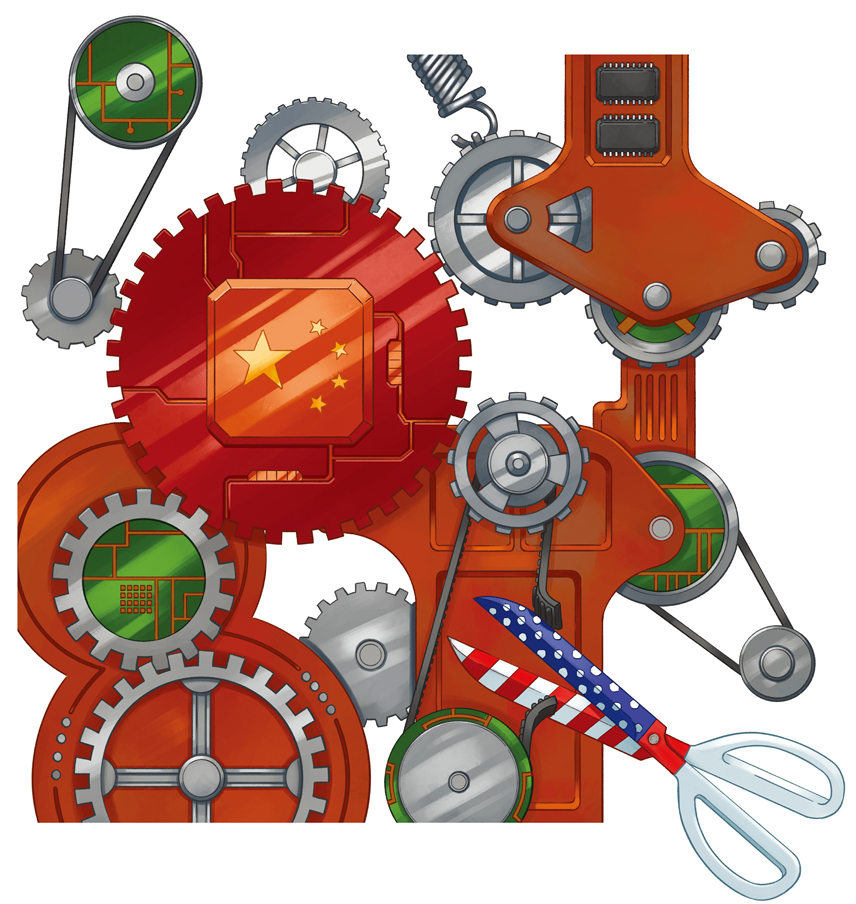China is a daunting place to bring intellectual property. It’s especially tough for businesses that produce content, like movies and music. Widespread piracy has all but shut out Western publishers, record labels, and television studios.
But for the video game industry, the Chinese gaming market is becoming central to growth. Not only is it vast and lucrative–in November, China became the largest consumer of smartphones–it’s also an unlikely driver of innovation. Gaming companies have been forced to adapt to China, whether that means developing new models for payment and distribution, taking creative approaches to IP, or partnering with pirates to reach their audiences. Some companies have even applied these lessons to markets back home. For years, China has represented the piracy problem. Now it may be the solution.
The game industry in China has adapted far more rapidly than its counterparts in music, movies, and books, says Cheung Kong Graduate School of Business (CKGSB) Assistant Professor of Strategy and Economics Brian Viard. “The music industry is painfully slow,” he says. “But if you look at games, I think they’ve been some of the most progressive companies.”
Three video game companies in particular–Rovio, creator of the “Angry Birds” franchise; PopCap, which made the hits “Bejeweled” and “Plants vs. Zombies” before being acquired by the studio Electronic Arts in July; and Blizzard Entertainment, which created the monumental “Warcraft” series–have tweaked their business models to fit China’s unusual gaming market. This, their executives say, will help them adjust their strategies around the world as piracy becomes more commonplace. “We see Asia as a kind of time machine into the future,” says James Gwertzman, Asia division chief of PopCap.
Lesson One: If You Can’t Beat Pirates, Join Them
When Rovio Chief Marketing Officer and “Angry Birds” developer Peter Vesterbacka came to Beijing last spring to discuss the company’s China strategy, he found that the game’s titular birds had preceded him. For months, local stores had been selling a dizzying array of copyright-violating merchandise based on the game, especially plush toys, which have become about as rare in China’s capital as rice.
Whereas a more traditional company might have dialed its lawyers, Rovio saw opportunity. Vesterbacka went on a pirated-goods shopping spree and showed up to a press conference announcing the merchandising plans with a bouquet of beaked balloons. The Finland-based company opened its first office outside Helsinki in Shanghai over the summer, and plans to open branded stores across the country. (Vesterbacka pointed at Hello Kitty’s 120 stores in China as a benchmark for the end of 2012.) Company leaders have begun boasting that they are “China’s most pirated brand”.
First, however, the company plans to parlay with the pirates. It may seem counterintuitive, but Vesterbacka argues that merchandise counterfeiters have a lot to gain by working with Rovio. If toy manufacturers pay licensing fees, Rovio designs in-game ads to promote their physical products to millions of Angry Birds fans. The strategy has helped Rovio build a large catalog of China-specific products, including,
if talks work out, a group of theme parks. (The idea was inspired by an unlicensed “Angry Birds” attraction at a theme park in Hunan province.)
PopCap struck a similar agreement with software pirates. When the company was preparing to release a new edition of “Plants vs. Zombies”, it created a free version in Chinese with built-in ads. “We contacted pirate sites and told them, if you take this game from us, we won’t make any trouble about it,” says Gwertzman. “Pretty much unanimously they all said sure.” It was win-win: The pirates got a clean, Chinese-friendly version of the game to hawk on their websites. PopCap got a captive audience for display ads pushing other PopCap games and merchandise. The Chinese version now has more than a million daily users, according to PopCap.
Rovio’s first China-only content was even more locally focused. During China’s Mid-Autumn Festival, the company released a set of Angry Birds levels in which players are challenged to collect moon cakes, a food traditionally eaten during the holiday. Rovio also produced and sold real “Angry Birds”-themed cakes in stores. The success of the Mid-Autumn Festival campaign confirmed Rovio’s hunch: A content provider’s most valuable resource isn’t copyrightable code or cartoon characters, but a network of fans willing to pay for a brand in many forms.
Merchandising has been key for PopCap, too. The company has sold “Plants vs. Zombies”-themed plush toys and branded clothing at major retail outlets, all inspired by counterfeit products. “We estimate that we have fans of the game in China who have never even played the game,” says Gwertzman.
Lesson Two: Make Games Accessible
Many people in China are willing to pay for content, says Gwertzman. It’s just that stealing it is often much easier.
The most obvious reason is price. Companies coming to China should rethink their pricing, says Viard. A high sticker price is off-putting to Chinese consumers, but they’re often willing to part with their money incrementally, he says.
Take Blizzard Entertainment, maker of the popular massively multiplayer online role-playing game (MMORPG) “World of Warcraft.” Blizzard uses different pricing structures in China tailored to lower incomes. For example, instead of paying the regular subscription fee for “World of Warcraft”, Chinese gamers can buy pre-paid cards. This arrangement allows all but the heaviest users to pay far less than gamers in other markets. For “Starcraft II”, a multiplayer game in which players direct armies in short battles, the company made the more radical move of selling cheap monthly subscriptions, instead of selling the game as a $50 boxed product as it does in the United States. The low prices work because the Chinese market is so big. “The average income is lower, but the marginal cost is essentially zero, so you can make up on volume,” says Viard.
Stealing may also be easier because international distribution channels don’t always work in China. Until November last year, Apple’s App Store didn’t accept Chinese credit cards. The Marketplace app for Google’s popular Android system still isn’t available in China. People who wanted to buy games or other apps for Apple’s iOS mobile operating system had to use a workaround: buying gift certificates from intermediaries with foreign credit card numbers. For traditional media, the obstacles are even bigger–DVD shops rarely stock anything but bootleg copies.
When Apple finally started accepting Chinese cards, sales of “Plants vs. Zombies” leapt up fivefold over the weekend, making it the highest-grossing app that week. “The middle class is willing to pay if you make it easy for them,” Gwertzman says. Rovio was able to work around the limitations of direct sales by licensing “Angry Birds” as a preinstalled bonus on Lenovo tablet computers and Nokia feature phones.
Translating games into Chinese also makes users in China more willing to pay for legitimate copies. According to PopCap’s data on pirate distribution, the release of a Chinese translation of the original version of the game made only a modest contribution to the game’s overall popularity in China, but it sparked a huge increase in the payment rate. After a spike in App Store sales, he said, they leveled off at nearly triple their previous level.
Then of course, there’s cultural translation. While Rovio’s moon cake-themed Angry Birds game was a hit, Gwertzman argues that localization plans should focus on understanding the market rather than patching on ersatz references to local culture: “We never thought ‘Plants vs. Zombies’ would be anywhere near as popular in China as its become, because the undead are not nearly as culturally relevant in China as in the U.S.”
Lesson Three: Free to Play, Costly to Win
Even if some fans won’t pay for content, they will pay for the chance to meet, impress, and, in some cases, defeat each other.
Many online games have solved the piracy problem by charging players not to play, but to interact and compete with other players, says Viard. This model is best known as the basis for Zynga’s “Farmville”. The game is free to play on Facebook, but offers players the chance to decorate their virtual farms or avoid time-consuming tasks by paying small amounts of real money. The model was popular enough to transform Zynga in two years from a startup into a company valued somewhere between $9 and $15 billion, with $306 million in revenue in the third quarter of 2011.
Aw Guo, the founder and CEO of Chinese gaming company MagnetJoy, says that for Chinese players, paying for in-game features is more than an incremental alternative to paying full price for a game–it has its own appeal. “When you beat someone in a game, it feels like you beat them in real life,” says Guo. “It’s addictive.”
Many Western gamers consider buying upgrades in competitive games cheating. Blizzard has for years battled private, largely Chinese, entrepreneurs who buy and sell powerful characters and items to “World of Warcraft” players, arguing that the practice alienates fans who expect to compete on a level playing field. But in China, the practice is normal, and indeed expected. ZT Online, one of China’s most popular MMORPGs, uses a model that explicitly fosters animosity among players and then sells them the weapons they need to get revenge. In order to encourage spending, the free-to-play game makes it largely impossible to earn higher- level upgrades–it takes an estimated 100,000 yuan to ascend to the game’s highest ranks. Foreign MMORPG developers have reportedly gotten complaints from fans about having to spend time rather than money to get ahead.
PopCap has applied these lessons to create a more Chinese version of “Plants vs. Zombies” on Renren, China’s closest equivalent to Facebook. The game is free to play, but players can buy upgrades. Weekly competitions allow players to show off to their friends and, if they’re good enough, a wider audience. But players don’t have a chance of getting on the high score lists unless they pay for upgrades. “What you’re buying isn’t fun, it’s bragging rights,” says Gwertzman.
Sometimes, players compete just to see who can spend the most money. MagnetJoy’s most successful game, Pet Party, began as a clone of a Facebook game in which players take care of a pet by buying furnishings for its house. To give players a chance to interact beyond their list of friends, MarketJoy added a virtual street with millions of identical houses players could buy in auctions–and a leaderboard that records the largest transactions. The virtual land became its own real estate market, with one house selling last November for 11,111 yuan. The land auctions saw similarly high bids on Russian and Brazilian social networks, Guo says, but excited little interest in developed-country markets like the Netherlands.
PopCap plans to take models developed in China back home. A “Plants vs. Zombies” social game will be added to Facebook once it’s been sufficiently fine-tuned in the Chinese market. If anything, Gwertzman says, PopCap has been too slow to borrow ideas from China. “When we saw free-to-play games in 2005, we recognized that they might one day come to America, but we didn’t realize then how fast Facebook would grow.”
PopCap and Rovio’s success in China may be a hard act to follow for a brand that isn’t already established. But any company with a piracy problem in China may have the same opportunities, Gwertzman says. Indeed, brands battling trademark infringement have used similar strategies to turn profits in China. In the 1980s, the Taiwanese restaurant chain Cafe 85 reached out to a wave of imitation Cafe 83s and Cafe 86s and turned them into profitable franchises. Luxury goods makers like Louis Vuitton can coexist with counterfeiters, since consumers tend to upgrade to the genuine article when they can afford it, according to a study by the China Market Research Group.
Other content providers, like record companies and television studios, can do the same in China. It’s a matter of finding ways to tie spending to the acts of reading, watching, and listening. This could mean giving content away to promote physical goods and live events, or it could mean rethinking the nature of content to incorporate social or competitive elements. If the experience of video game developers is any indication, those kinds of changes wouldn’t just solve the China problem–they could revolutionize entire industries.
















